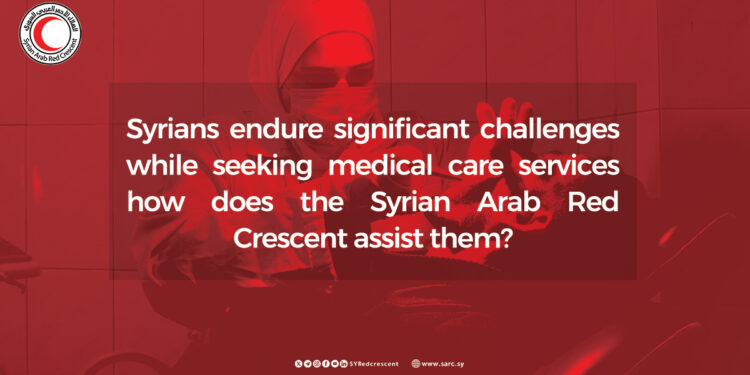The Syrian conflict has significantly impacted Syrians’ access to medical care, with rising costs and damaged infrastructure creating a major burden.
This is especially challenging for people with disabilities who often require specialized services.
Fortunately, the Syrian Arab Red Crescent (SARC) helps bridge this gap.
Jamil, a father of four, felt helpless when he learned his son needed expensive hearing aids his meager income from tailoring couldn’t afford. However, a visit to the Al-Sakhour Medical Complex, run by SARC in Aleppo, changed everything.
After diagnosis, his son received free hearing aids, allowing him to finally hear his family’s voices. Jamil’s story is just one example of how SARC helps ensure people with disabilities receive the care they need.
Beyond offering basic medical services, SARC provides crucial support for those with specific needs.
Yamen’s grandmother, caring for her grandson with cerebral palsy, struggled to afford physical therapy. Thanks to SARC’s mobile physical therapy team, Yamen can now walk and attend school. Similarly, Rimas, a young girl with quadriplegia, received a wheelchair from SARC, enabling her to leave her room for the first time.
SARC’s mobile clinics are a lifeline for many Syrians, especially in remote areas.
In the countryside of Latakia, 76-year-old Salwa relies on weekly visits to monitor her blood sugar and blood pressure and obtain chronic medications.
The high cost of medical care forces many to make difficult choices, like Saleh, who travels 5 kilometers for his family’s care, or Abdul-Mateen, who depends on SARC for medication since his retirement salary can’t cover doctor visits. The mobile clinic in Quneitra helps Ayoub obtain medicine for his wife’s neurological disease, alleviating a significant financial burden.
The elderly face particular challenges. Fattoum, 80, in Deir ez-Zor, waits at the mobile clinic after suffering a stroke, as her village only has a vaccination dispensary. SARC also provided a crutch to Halima, 65, who lives alone in Raqqa, allowing her to move safely.
SARC also aids children in need. Sila suffered from malnutrition when she was six months old due to displacement and her family’s limited resources. However, SARC’s nutrition clinic diagnosed and treated her with peanut butter and milk, leading to her recovery.
UN estimates indicate that 14.9 million people in Syria need assistance to obtain life-saving health services.
The crisis has exacerbated the fragility of the health sector, with declining humanitarian support, deteriorating health conditions, outbreaks of infectious diseases, and damage from the earthquake.
These are just a few examples of the Syrian Arab Red Crescent’s lifesaving work. In 2023 alone, SARC provided medical services to over 3.7 million people.
Their interventions offer a glimmer of hope for a healthier future, particularly for Syria’s most vulnerable families.


